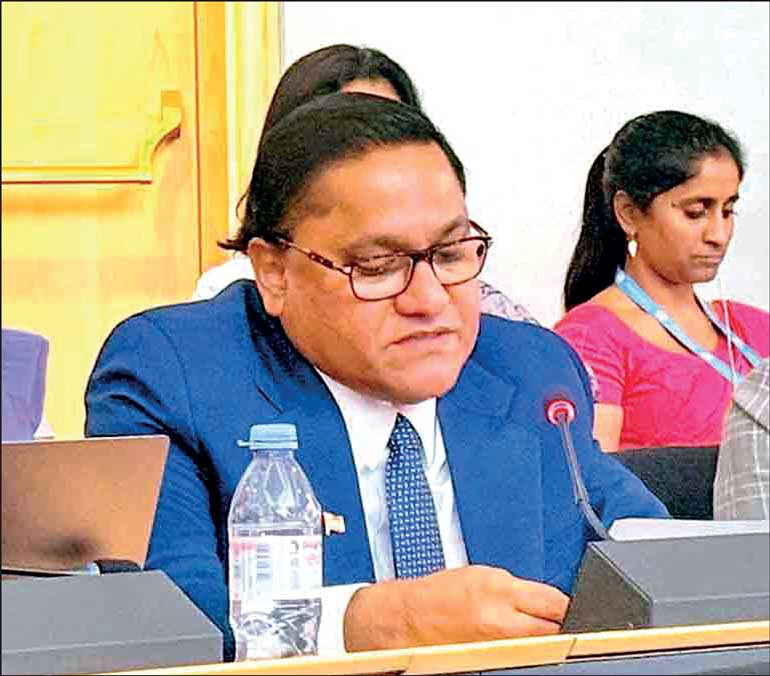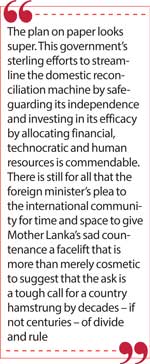Tuesday Feb 17, 2026
Tuesday Feb 17, 2026
Thursday, 11 September 2025 00:24 - - {{hitsCtrl.values.hits}}

Of course, no lover of a land like no other in their right mind would gainsay what Vijitha Herath told the watching world in the aftermath of the blood moon
 The blood moon of the night of 7 September brought with it a panoply of portents for Sri Lanka. A lunar eclipse lasting almost one and a half hours, its visibility was marred to some degree by intermittent scudding clouds. Very few islanders however, usually superstitious to the nth, paid heed to prophecies of doom and gloom; opting instead to interpret the celestial show as favourable for once.
The blood moon of the night of 7 September brought with it a panoply of portents for Sri Lanka. A lunar eclipse lasting almost one and a half hours, its visibility was marred to some degree by intermittent scudding clouds. Very few islanders however, usually superstitious to the nth, paid heed to prophecies of doom and gloom; opting instead to interpret the celestial show as favourable for once.
In the wake of the night-time heavenly spectacle came Sri Lanka’s showing at the 60th United Nations Human Rights Council sessions in Geneva. Led by the redoubtable Vijitha Herath fronting the island’s case as its foreign minister, the once embattled nation state had many eyes squinting at the fine print of the text.
That the portents were good was not in doubt except in the ranks of Tuscany where the JVP-led coalition’s critics, cynics and sundry scoffers sit in perhaps premature judgment on the tyro government.
On the cards were a host of positive developments in potential terms as well as in practice already that could or should have brought a more cheerful smile to the face of the presenting mandarin.
To wit:
But why do I feel as if I am losing you? And is that dour minister – party hatchet man: jury, judge and executioner of past socio-political miscreants – not smiling because he senses that the government has miles to go before our nation state at last can sleep more soundly at night?
Of course, no lover of a land like no other in their right mind would gainsay what Vijitha Herath told the watching world in the aftermath of the blood moon.
But too much blood and ink have been spilled before to no salutary end for even national reconciliation championing stalwarts not to pause before urging their chargers on.
It would be a pity – and not for the first time – that fancy words and even the sincerest intentions in Geneva don’t translate into ground realities from Galle through Kegalle to Kankesanthurai. This likelihood looms over Sri Lanka like that 7-9/10ths cloud cover on the night of the lunar eclipse.
The true north
 For one, the government would do well to anticipate that not every good intention – much less deed – goes unpunished. The tangled web that is state bureaucracy could work overtime (not literally, of course) to stymie the transfer of state-appropriated land and buildings back to their rightful owners. And the clause (that where it is not feasible to effect the happy event for the dispossessed, they would be adequately compensated) is the only bulwark against anger, frustration and disappointment all round if all is not well that ends well.
For one, the government would do well to anticipate that not every good intention – much less deed – goes unpunished. The tangled web that is state bureaucracy could work overtime (not literally, of course) to stymie the transfer of state-appropriated land and buildings back to their rightful owners. And the clause (that where it is not feasible to effect the happy event for the dispossessed, they would be adequately compensated) is the only bulwark against anger, frustration and disappointment all round if all is not well that ends well.
For another, law enforcement and local authorities will have to work overtime (naturally, quite literally) to come on board with the programme in terms of the incumbent administration’s promises to a still-grieving people. On the one hand, the latter has promised that people from all parts of the country can memorialise their dead and missing without any let or hindrance. On the other, the lived experience of those attempting to do so in Colombo last year (how then the true north of the country’s most grievous wounds?) was met with the customary resistance from the usual suspects. Thus guaranteeing the right to remember still seems contingent on meeting the chauvinistic criteria of gangs, goons and their string-pulling political masterminds of a previous dispensation?
Then again, there is the hoary issue of enabling independent (and dare one add, hopefully fruitful) investigations into assassinations, abductions, enforced disappearances, and other dire eventualities of Sri Lanka’s traumatic decades of conflict. While the government has certainly bolstered the legislative and administrative frameworks to expedite such cases, it may no longer be possible to breathe fire into lost trails long run cold in any case. And girding one’s loins against rearguard action from the deep state would be advised, in addition to developing a practicable legal and political strategy against happenstance and ‘enemy action’!
Last not least – civil society would so well to safeguard the social contract against hijacking by notoriously self-interest-motivated regimes in the matter of reintroducing old strictures on civil rights and individual liberties under the guise of dismantling old legislation and ratifying new laws. Of particular interest would be for watchdogs to be especially vigilant that repealing the PTA does not lead to smuggling in the same or worse clauses in the new counterterrorism legislation – by whatever name the new law is known. And ditto in the case of amendments to the insidious Online Safety Act (OSA) through which – despite the face of it being cosmetically brushed by ‘consultations’ with ‘stakeholders’ – odious traps could be set to stifle dissent.
The plan on paper
The plan on paper looks super. This government’s sterling efforts to streamline the domestic reconciliation machine by safeguarding its independence and investing in its efficacy by allocating financial, technocratic and human resources is commendable. There is still for all that the foreign minister’s plea to the international community for time and space to give Mother Lanka’s sad countenance a facelift that is more than merely cosmetic to suggest that the ask is a tough call for a country hamstrung by decades – if not centuries – of divide and rule...
The need of the hour then is not a rehearsing of trite assurances, politicised platitudes and hoping for the best that the people concerned would have no cause to feel gulled again.
There is also the truth hiding in plain sight that over and above those wounded, victimised and traumatised by the civil war or ethnic conflict or whatever it is politic to call it these days, there is the not insubstantial and by no means insignificant segment of influential people, pacts, clans, covens, cabals and apex bodies of power brokers not entirely enthused by who’s driving the project this time round.
That may be a start in terms of developing a new and captivating vision that would recruit rather than suborn the greatest good of the greatest number in a national reconciliation movement that must begin to succeed – and be seen to do so over and above nodding acknowledgment – long before a once bankrupt nation kneels before the bastion of economic stability again.
It is a time and a space for all the people and the government of still only some of the people to change the face of their clannish, clique-driven and vested interests motivated mindset.
Not only because a government minister said so in Geneva. But for a larger reason that decades of economic opportunities lost must convince even the atheistic or agnostic at best in Sri Lanka that national unity must precede and provide a platform for growth, development and progress. There is no sustainable trajectory without goodwill, decency and peace with justice for all.
(Editor-at-large of LMD | Son of a sunny isle still under cloud cover)